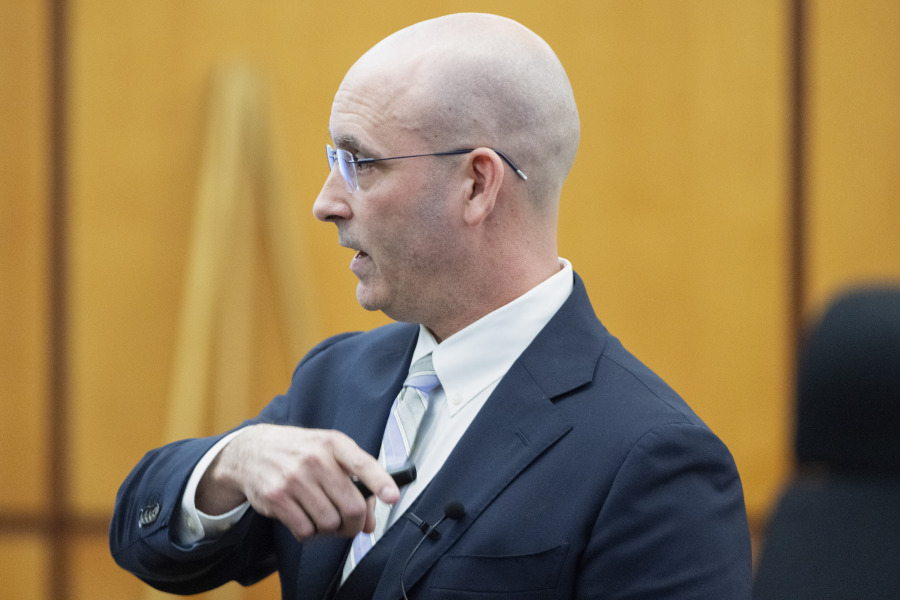TACOMA — Lawyers for three Washington state officers charged in the death of a Black man who was beaten, shocked and hogtied facedown on a sidewalk made their final arguments to the jury Wednesday before the prosecution had the final say and the jury was told to return Thursday to begin deliberations.
Two of the officers’ lawyers focused their final arguments on the autopsy report, which said Manuel Ellis had a fatal level of methamphetamine in his system when he died. They also noted that the medical examiner said the spit hood, which was put on by a different officer, “was a significant factor and possibly the most important factor” in his death. The drugs were the cause, the lawyers concluded.
Special prosecutor Patty Eakes, on behalf of the Washington Attorney General’s Office, made rebuttal arguments and emphasized that the medical examiner knew about Ellis’ medical conditions and concluded he died of hypoxia due to physical restraint. The officers should have known he was going in that direction because he repeatedly said he could not breathe.
After Eakes finished, Judge Bryan Chushcoff dismissed the alternate jurors and instructed the seven-man, three-woman jury to return Thursday morning to begin deliberations after the lawyers finished marking the exhibits in the case.
Ellis died March 3, 2020, nearly three months before George Floyd’s death would spark an international outcry against police brutality. This is the first trial of officers charged in a suspect’s death since voters approved a measure in 2018 removing a requirement that prosecutors must prove police acted with malice.
Two of the Tacoma, Washington, officers — Matthew Collins, 40, and Christopher Burbank, 38, — were charged with second-degree murder and manslaughter. Timothy Rankine, 34, is charged with manslaughter. Their trial has been going on for nine weeks.
Wayne Fricke, who represents Burbank, told the jury on Tuesday that Ellis was responsible for his own death because his behavior made the officers use force, but Eakes argued he was defending himself from their attacks, as shown by videos and witness testimony.
On Wednesday, Collins’ lawyer Jared Ausserer highlighted portions of the autopsy report that said the concentration of methamphetamine in Manuel Ellis’ blood “was well within the fatal range.” An expert testifying for the defense said the drugs and his damaged heart caused cardiac failure, Ausserer said.
Collins had no reason to assault Ellis, he said.
“You have to ask yourself, ‘Why in the world would Matthew Collins risk everything?’” Ausserer told the jury. “He just had a baby. Why would he randomly attack some guy walking down the street?”
Mark Conrad, lawyer for Rankine, who is charged with manslaughter for holding Ellis facedown on the sidewalk as he repeatedly said he could not breathe, urged the jury to recall the officer’s testimony about how he acted once he arrived on the scene.
Rankine checked Ellis for injuries and weapons, Conrad said. He removed the Taser probes from Ellis’ body, noticed he was hot and checked his pulse. As he tried to hold Ellis in place, he began to thrash around, so Rankine put him back on his stomach.
“He’s modulating his force and action to what Mr. Ellis was doing,” Conrad said. “If he was doing anything wrong, other officers would have intervened.”
Conrad noted that another officer, not Rankine, put the spit hood on Ellis’ head, and the medical examiner said it may have been an important factor in his death.
“Officer Rankine is not trained on it. He’s never used it. He did not assist the other officer in putting it on,” Conrad said. “Our client was caring for Mr. Ellis.”
On rebuttal, Eakes challenged a number of the claims made by the defense lawyers. One said the jury should not trust some of the witnesses because they didn’t come forward right way. But Eakes pointed out that two witnesses did not know Ellis had died until they saw it in a newspaper. Only then did they come forward.
The lawyers said the officers didn’t hear Ellis say he couldn’t breathe because they were suffering from a condition called “auditory exclusion,” which is a temporary hearing loss when under stress. Eakes said that can affect an officer’s ability to hear things happening around him, not the suspect directly in front of him. In addition, Ellis said it four times after he was handcuffed, long after the struggle with the first two officers ended.
Ellis wasn’t psychotic that night, as the lawyers suggested, Eakes said. She said in the video he’s not threatening, not incoherent, he wasn’t out of control and that he’s clearly saying, “Please, can’t breathe. Sir, please, I can’t breathe.”
“Mr. Ellis didn’t need to die that day,” Eakes said. “If only he had been granted the dignity of being human.”



